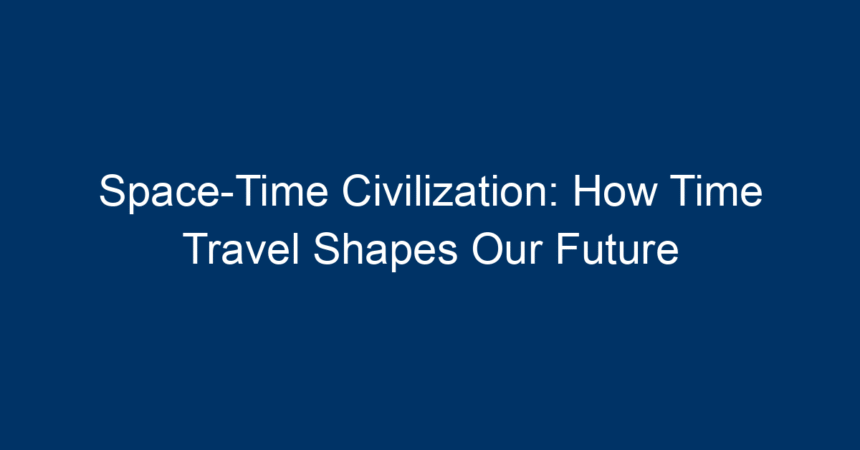The concept of a space-time civilization, where time travel transforms our existence, is no longer the domain of science fiction. As technology rapidly advances, we find ourselves on the brink of potentially bending the very fabric of reality. In this article, we will explore how time travel influences our understanding of history, technology, ethics, and human potential, painting a vivid picture of what our future could look like in a true space-time civilization.
The Fascination with Time Travel
Time travel has captivated human imagination for centuries, appearing in literary works by H.G. Wells and feeling many journalistic inquiries into quantum mechanics. Theoretical frameworks like Einstein’s relativity have opened doorways to the notion that traveling through time isn’t just a fantasy; it’s theoretically plausible. But why does time travel hold such importance in our cultural imagination?
A Gateway to Possibilities
The allure of time travel lies in its promise—to transcend limitations. Imagine the power to visit past civilizations, observe pivotal historical moments, or even glimpse the potentials of the future. Such capabilities could reshape various fields, including education, science, and governance.
The Science Behind Time Travel
At its core, the concept of a space-time civilization hinges on the understanding of physics and cosmic anomalies. Albert Einstein introduced two revolutionary theories: Special Relativity and General Relativity. These theories suggest that gravity and speed can warp time, leading to scenarios where time travel becomes feasible. Concepts such as wormholes, time dilation, and black holes are explored rigorously.
Wormholes: Portals through Space-Time
Wormholes, often depicted in science fiction, are bridges between different points in space and time. While their existence remains hypothetical, equations derived from relativity suggest they could connect distant parts of the universe or even different time periods. Harnessing such gateways could pave the way for a true space-time civilization.
The Concept of Time Dilation
Time dilation is another fascinating aspect of relativity. It tells us that time is experienced differently for observers in different frames of reference. For example, astronauts traveling at high speeds in space would age more slowly than people on Earth. This reality adds depth to our understanding of time, highlighting the malleable nature of our experience.
The Historical Perspective
Bridging the Gap to Our Past
One of the most compelling implications of time travel in a space-time civilization is the ability to revisit significant historical events. This not only allows for accurate historical analysis but could also reshape our understanding of identity and culture.
Learning from History
By witnessing key moments in human history, from the signing of the Declaration of Independence to the fall of the Berlin Wall, we could gain insight into the factors that shaped our world. This knowledge could guide current and future generations, helping them make informed decisions.
The Ethical Dilemma of Intervention
However, the ability to alter the past brings forth ethical concerns. If time travelers can influence historical events, the ramifications could be unforeseen. Would we enhance or detract from the course of history? A space-time civilization must navigate the treacherous waters of ethical dilemmas regarding intervention in history.
Future Visions
Conversely, time travel also presents the opportunity to glimpse the future. It raises questions about destiny and free will while presenting data that could compel societal and technological evolution.
Innovations for Tomorrow
By understanding the challenges we might face—like climate change or geopolitical strife—future insight could encourage proactive solutions, fostering a society equipped for resilience and adaptability. This predictive capacity is integral to a thriving space-time civilization.
Economic and Technological Transformations
The Economy of the Future
A space-time civilization could revolutionize the economy. From understanding the financial impacts of historical downturns to forecasting future markets, the implications are profound.
Temporal Markets
Imagine creating temporal currencies that value transactions based on predicted outcomes instead of just historical performance. This might stabilize economies, reduce crashes, and streamline trade on Earth and across interplanetary systems.
Technological Integration
As we journey into this space-time civilization, the fusion of time travel technology with artificial intelligence opens avenues for advancements we can only dream of. Enhanced computation could lead to simulations that pave the road for efficient time travel.
Social and Ethical Implications
A New Social Agenda
As time travel becomes a facet of daily life, society must grapple with its implications. Questions of access arise: Who gets to travel through time? Will it remain an exclusive privilege, or can everyone experience it?
Education and Time Travel
Incorporating time travel into education could redefine learning. Imagine walking through ancient Rome or witnessing the Renaissance firsthand. This could lead to enhanced empathy and understanding, fostering a globally interconnected world.
The Moral Quagmire
The moral implications of altering time extend to sensitive topics, such as war, genocide, and societal oppression. A space-time civilization must create frameworks that prioritize justice, ethics, and collective well-being.
The Human Element: Navigating the Future
Personal Growth and Development
Time travel could serve as a tool for personal evolution. Imagine having the ability to confront past traumas or learn from future mistakes. Such experiences could foster emotional resilience, empathy, and human connection.
Creative Renaissance
The creative sectors may also flourish. Artists, authors, and musicians could draw inspiration from every moment in human history, resulting in an unprecedented fusion of styles and genres. A vibrant cultural tapestry would emerge in a space-time civilization.
Conclusion: Embracing a Space-Time Civilization
As we look to the stars and contemplate the intricate weave of space and time, the vision of a space-time civilization beckons us to rethink our place in the universe. The potential for time travel to transform our society is immense, offering pathways to understanding our past and shaping our future.
However, this exploration comes with responsibilities. It is essential that we develop ethical frameworks and equitable systems for time travel, ensuring that this extraordinary capability serves all humanity.
So, whether through the lens of science or imagination, let us embark on this thrilling journey toward a space-time civilization with an earnest commitment to wisdom, empathy, and progress. The future, as always, is ours to create.




